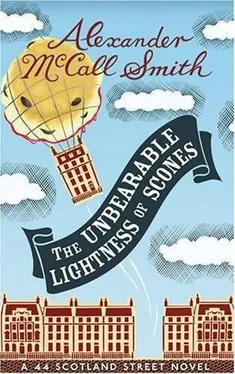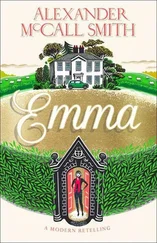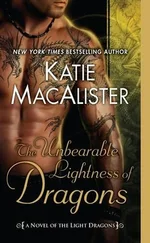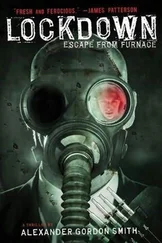Alexander Smith - Unbearable Lightness of Scones
Здесь есть возможность читать онлайн «Alexander Smith - Unbearable Lightness of Scones» весь текст электронной книги совершенно бесплатно (целиком полную версию без сокращений). В некоторых случаях можно слушать аудио, скачать через торрент в формате fb2 и присутствует краткое содержание. Жанр: Триллер, на английском языке. Описание произведения, (предисловие) а так же отзывы посетителей доступны на портале библиотеки ЛибКат.
- Название:Unbearable Lightness of Scones
- Автор:
- Жанр:
- Год:неизвестен
- ISBN:нет данных
- Рейтинг книги:4 / 5. Голосов: 1
-
Избранное:Добавить в избранное
- Отзывы:
-
Ваша оценка:
- 80
- 1
- 2
- 3
- 4
- 5
Unbearable Lightness of Scones: краткое содержание, описание и аннотация
Предлагаем к чтению аннотацию, описание, краткое содержание или предисловие (зависит от того, что написал сам автор книги «Unbearable Lightness of Scones»). Если вы не нашли необходимую информацию о книге — напишите в комментариях, мы постараемся отыскать её.
Unbearable Lightness of Scones — читать онлайн бесплатно полную книгу (весь текст) целиком
Ниже представлен текст книги, разбитый по страницам. Система сохранения места последней прочитанной страницы, позволяет с удобством читать онлайн бесплатно книгу «Unbearable Lightness of Scones», без необходимости каждый раз заново искать на чём Вы остановились. Поставьте закладку, и сможете в любой момент перейти на страницу, на которой закончили чтение.
Интервал:
Закладка:
“And how many people benefited from Lard’s generosity? When I retired from the school, years after Lard had left it, he came round to the school office and left me a present. It was a set of keys to a car, which he wanted me to have for my retirement. What a gesture that was. And the fact that there was a small dispute later about that car in no way took away from his thoughtfulness and his generosity. That was Lard all over.
“Some people may have had their differences with Lard over the years. There are some who say he cut corners. All that may be true, but on a day like this, we should not remember the bad things a man may have done, but we should remember the good. If Lard has anything to answer for – and, like the rest of us, he was not perfect – then he will answer for it in another place. He will no doubt ask for forgiveness and he will receive it, for that is what we are taught, and that is what we believe. So let none of us go from this place thinking ill of Aloysius Ignatius Xavier O’Connor, but thinking rather of his many acts of kindness, his humour, the joy he brought to those who loved him. And may there grow on his grave spring flowers from those memories. Spring flowers.”
There was complete silence as the teacher stepped away from the lectern and made his way back to his seat. At the back of the church, which was filled to the very last pew, a man cleared his throat, coughed. The priest stood up, and the rustle of his vestments was amplified by the microphone he wore attached to his front. Angus looked at Matthew; both had been moved by this oration. Matthew thought: What a kind man that teacher is, and Angus thought: That is what makes this city.
They stood to sing a hymn, and the priest said a final prayer. Then it was over, and Lard, resting on a trolley bedecked with flowers, was wheeled out of the church, out into the light.
Waiting while the crowd of mourners filed out of the church, Matthew looked at the faces. There were a number of scars: scars across cheeks, nicks across the forehead. There were signs of all the hardness to which parts of Glasgow were well-accustomed; which it joked about and made light of, even in a perverse way; but which had cut deep, deep into its soul. This was the funeral of a gangster who happened to be Catholic; the funeral of a Protestant gangster would have involved the same sort of people: no difference.
And outside, people stood and chatted, shook hands, comforted one another. The light was bright, shafts of sunlight shone through clouds that had parted to bathe the city in patches of silver and gold. In a few minutes rain might drift in over the Atlantic, veils of it falling over this place, but for now it was dry.
Lard lay in glory in a glass-sided hearse to which a black, plumed horse had been yoked. He lay surrounded by flowers, great wreaths spelling out messages from friends and family. LARD said one; and another, BIG MAN, and QUALITY. And then there was the biggest wreath of all, which simply said: DEID.
“I think that we should get back to Queen Street,” said Angus.
Matthew agreed. He had been strangely moved by the service and he did not want to break the spell.
They started to move down the path that led from the church to the road, but they were stopped by a squat man in a black overcoat.
“Youse ra boys frae Edinburgh?” he asked.
“We are,” said Angus.
“Youse still got Lardie’s painting?”
Matthew glanced at Angus. “Yes, I suppose we have.”
The squat man seemed relieved. “Well I’m Frankie O’Connor, Lard’s wee brother. I’ll come through and pick it up next week, if that’s all right wi’ youse. Better be.”
“Of course,” said Matthew. “And I’m sorry about your brother.”
“Thank you,” said Frankie. “But he had it coming to him, so he did.”
81. Best-Laid Plans
By unspoken agreement, Angus and Matthew did not talk about Lard O’Connor’s painting in the taxi back to Queen Street station. They had been moved by Lard’s obsequies, and by the eulogy delivered by his former teacher. And, as is always the case on such occasions, they had been reminded of their own mortality. I must paint my great painting, thought Angus; time is running out. And perhaps I should get married too, if anyone will have me. Domenica? She would be ideal – at least she knows what I’m like – but there’s the problem with Cyril, which is irresoluble. Could he live on the landing, in some sort of heated kennel? Antonia would veto that, although with her drug-dealing she’s hardly in a position to criticise anybody for anything.
“You know that woman,” he said to Matthew, once their train journey had started. “You know that woman who lives opposite Domenica?”
“Not really,” said Matthew. “Domenica introduced me to her once at the end of Cumberland Street. She said something about saints.”
“She’s meant to be writing a book about Scottish saints,” said Angus. “She goes on about them. All these peculiar saints who lived in places like Whithorn. Apparently virtually everyone was called a saint in those days. You just had to put a few stones together, call it a church, and you became a saint.”
Matthew did not think it was that easy. Nothing was easy in those days. “Life was pretty hard,” he said. “There was a great deal of darkness. In the metaphorical sense, of course.”
“And now?” asked Angus. “No darkness?”
“Oh, there’s darkness,” said Matthew. “We happen to live in a country where there isn’t – at the moment. But it could change. All that would be needed would be for people to become ignorant again. And they are.”
Angus looked around the carriage. Virtually everybody was reading. “I don’t know,” he said.
“Well,” said Matthew, “did you see that survey published in the papers the other day where people were asked if they believed Winston Churchill ever existed? A quarter of them said they thought he was mythical.”
Angus reflected on this for a moment. There had also been the question of Scottish history. There were surveys all the time which showed that people had no idea who they were or why they were there. Perhaps he should execute a great painting – a great allegorical painting – entitled Who Am I? which would show the link between past and present. But nobody painted like that any more. He would be laughed at in the Royal Scottish Academy. He would be ridiculed. Paintings today had to reflect nothingness and confusion, not order and intellectual coherence.
He decided to return to the subject of Antonia. “That woman may be writing about saints, but…” He leaned forward to address Matthew confidentially. “She’s a drug-dealer. A big one.”
Matthew looked startled. “In Scotland Street? Under Domenica’s nose?”
“Yes,” said Angus. “I overheard her placing a big order. She talked about the stuff being cut to her satisfaction. She talked about being careful, as she did not want to go to prison. It was perfectly obvious what was going on.”
For a few moments Matthew said nothing. Then, “The problem in these cases is always: what do you do?”
Angus snorted. “That’s the problem in life in general, surely.”
“Perhaps. But do you go to the police? And what about us, Angus? What do we do about Lard’s painting?”
Angus sat back in his seat. “I don’t know. I really don’t know. But first things first: should we really call it Lard’s painting? Was it ever his?”
“He brought it to us.”
“Of course. But do you think for one moment that it belonged to that aunt of his in Greenock?”
Matthew had to agree that this was unlikely.
“So it’s stolen property,” said Angus. “Every bit as stolen as the Duke of Buccleuch’s da Vinci was – before they recovered it.” He paused. “And you can’t just sit on stolen property.”
Читать дальшеИнтервал:
Закладка:
Похожие книги на «Unbearable Lightness of Scones»
Представляем Вашему вниманию похожие книги на «Unbearable Lightness of Scones» списком для выбора. Мы отобрали схожую по названию и смыслу литературу в надежде предоставить читателям больше вариантов отыскать новые, интересные, ещё непрочитанные произведения.
Обсуждение, отзывы о книге «Unbearable Lightness of Scones» и просто собственные мнения читателей. Оставьте ваши комментарии, напишите, что Вы думаете о произведении, его смысле или главных героях. Укажите что конкретно понравилось, а что нет, и почему Вы так считаете.












